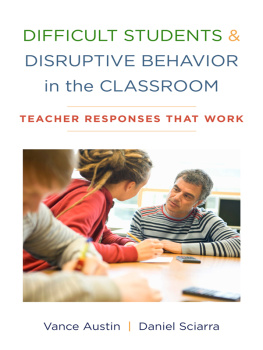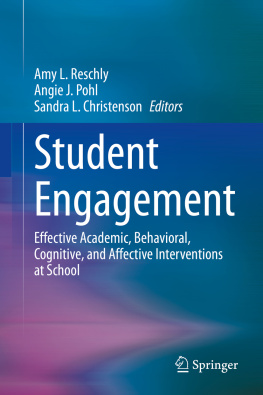

Copyright 2018 by Solution Tree Press
Materials appearing here are copyrighted. With one exception, all rights are reserved. Readers may reproduce only those pages marked Reproducible. Otherwise, no part of this book may be reproduced or transmitted in any form or by any means (electronic, photocopying, recording, or otherwise) without prior written permission of the publisher.
555 North Morton Street
Bloomington, IN 47404
800.733.6786 (toll free) / 812.336.7700
FAX: 812.336.7790
email:
SolutionTree.com
Visit go.SolutionTree.com/RTI to download the free reproducibles in this book.
Printed in the United States of America
222120191812345

Library of Congress Cataloging-in-Publication Data
Names: Weber, Chris (Chris A.), author.
Title: Behavior : the forgotten curriculum : an RTI approach for nurturing essential life skills / Chris Weber.
Description: Bloomington, IN : Solution Tree Press, [2018] | Includes bibliographical references and index.
Identifiers: LCCN 2017049055 | ISBN 9781943874323 (perfect bound)
Subjects: LCSH: Problem children--Education--United States. | Behavior disorders in children--United States. | Response to intervention (Learning disabled children)--United States. | Academic achievement--Psychological aspects. | Behavioral assessment of children. | Metacognition in children. | Behavior modification.
Classification: LCC LC4802 .W43 2018 | DDC 371.93--dc23 LC record available at https://lccn.loc.gov/2017049055
Solution Tree
Jeffrey C. Jones, CEO
Edmund M. Ackerman, President
Solution Tree Press
President and Publisher: Douglas M. Rife
Editorial Director: Sarah Payne-Mills
Art Director: Rian Anderson
Managing Production Editor: Kendra Slayton
Production Editor: Alissa Voss
Senior Editor: Amy Rubenstein
Copy Editor: Ashante K. Thomas
Proofreader: Elisabeth Abrams
Cover Designer: Rian Anderson
Acknowledgments
As an author, consultant, and educator, there is no better partner than Solution Tree. Guided by Jeff Jones, Solution Tree is the preeminent educational publishing and professional development company in the world. There is no finer man or publisher than Solution Tree Press president and publisher, Douglas Rife, and I thank him for a decade of support. Thanks to Alissa Voss for her outstanding support in editing this book; no one supports an author in creating a book better than Solution Tree. I must thank the professional development and events departments at Solution Tree, led by Shannon Ritz and Renee Marshall, for supporting me and others as we share our passion and ideas with colleagues around the world. I hope this book moves Solution Tree one step closer to achieving their vision of transforming education worldwide. The systematic behavior supports described in this book are grounded squarely in the research of positive behavior interventions and supports (PBIS). George Sugai and Rob Horner, guiding lights in PBIS, have made such a significant and positive impact on schools. While I did not collaborate directly with these researchers on this book, I thank them for their collective contributions to our profession. Thanks to my friends, coauthors, and colleagues Mike Mattos, Austin Buffum, Janet Malone, and Laurie Robinson Sammons for guiding me so patiently and wisely in my professional journey. Finally, I believe that Rick DuFour was the most innovative, transformational, and significant educator in the United States since Benjamin Bloom; I miss him and honor his work. There is no response to intervention (RTI), multi-tiered system of support (MTSS), or positive behavior interventions and supports (PBIS) without the foundations of Professional Learning Communities at Work. Along with Bob Eaker, Becky DuFour, and PLC at Work associates, I look forward to a day when PLCs are not something we do, but simply who we are.
Solution Tree Press would like to thank the following reviewers:
Margaret Adams
Assistant Superintendent for Teaching and Learning
Melrose Public Schools
Melrose, Massachusetts
Hailey Lehman
Regional Behavior Specialist
Rochester, New York
Louis Lim
Vice Principal
Bayview Secondary School
Richmond Hill, Ontario
Canada
Nancy Moradi
Positive Behavioral Interventions and Supports Coach
San Jose Unified School District
San Jose, California
Lucy Worthington
Response to Intervention Coordinator/Behavior Specialist
Jeff Davis County Schools
Hazlehurst, Georgia
Visit go.SolutionTree.com/RTI to download the free reproducibles in this book.
Table of Contents
About the Author

Chris Weber, EdD, is an expert in behavior, mathematics, and response to intervention (RTI) who consults and presents internationally to audiences on important topics in education. As a teacher, principal, and director in California and Illinois, Chris and his colleagues developed RTI systems that have led to high levels of learning at schools across the United States.
In addition to writing and consulting, he continues to work in Irvine Unified School District in California, supporting some of the best and highest-performing schools in the country.
Chris has been in service to community and country his entire life. A graduate of the U.S. Air Force Academy, he flew C-141s during his military career. He is also a former high school, middle school, and elementary school teacher and administrator.
To learn more about Chriss work, visit Chris Weber Education (http://chriswebereducation.com) or follow @WeberEducation on Twitter.
To book Chris Weber for professional development, contact pd@SolutionTree.com.
Introduction
Behavior is a form of communication providing clues about what is missing in a young persons life.
JOHN SEITA
Jacob is a fourth-grade student in an urban school district. After losing his mom three years earlier, Jacob, his older brother, and younger sister now live in a single-parent home. Their father works two jobs to take care of the family, but he doesnt earn enough wages to pay all the familys living expenses. Jacobs aunt often cares for him and his siblings along with her three younger children. Some days, Jacobs aunt asks the older children to watch the younger children. Jacobs role as caregiver means he often makes his brother, sister, and cousins breakfast, helps them get dressed, organizes their lunches and backpacks, and walks them to their classrooms. Jacob is sometimes late to his own class or absent on these mornings.
Jacob and his siblings have witnessed varying degrees of violence and drug use in the community. His dads work demands make it hard to have routines, like a set bedtime or homework time. Jacob and his siblings sometimes dont have meals at home. Jacob is often hungry but feels ashamed to ask for extra food at school, while watching other students waste theirs.
Despite these traumas, Jacob likes school. Jacob enjoys numbers and logic puzzles and has experienced success in mathematics. He has good peer relationships and generally fits in well in classes. When he is attentive, his teachers remark that he is a good contributor and can be seen smiling. When he is not, his teachers become concerned about the impact of Jacobs inattentiveness on his learning and of his disruptions on others learning. When Jacob becomes frustrated, he lashes out verbally, and occasionally, physically. Staff recognize that detentions and other negative consequences that have been assigned are having little impact but dont know of other strategies. They want a consistent approach for all students, and not separate rules for Jacob. Jacobs father is busy and has a difficult time committing to school appointments, but when his father has met with staff, he has expressed his respect and support for a good education. He wants a better life for Jacob and his other children
Next page












